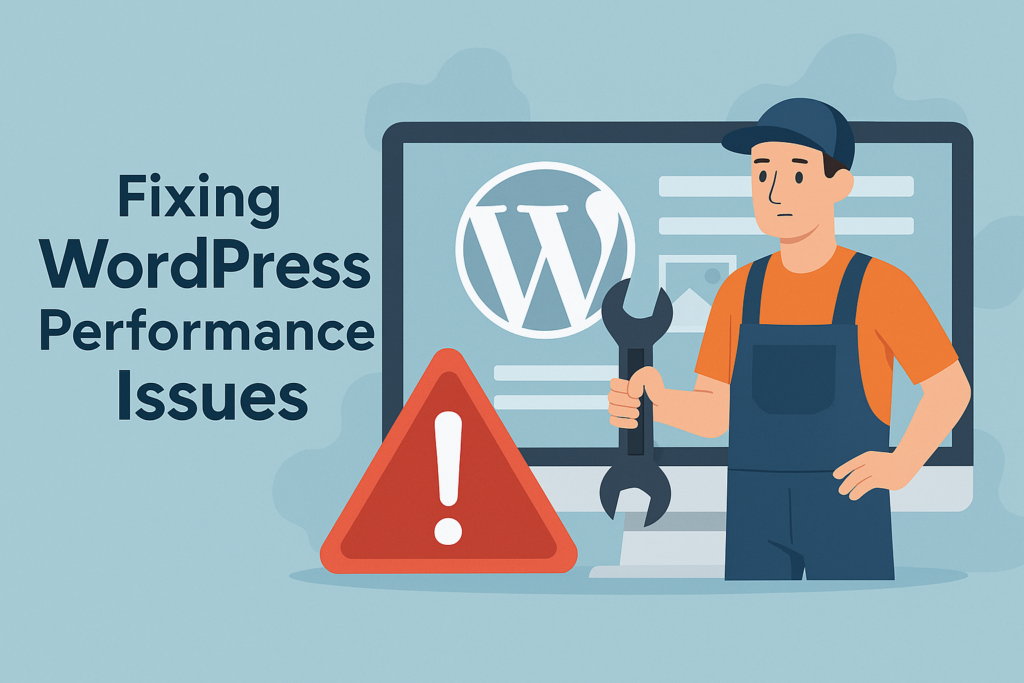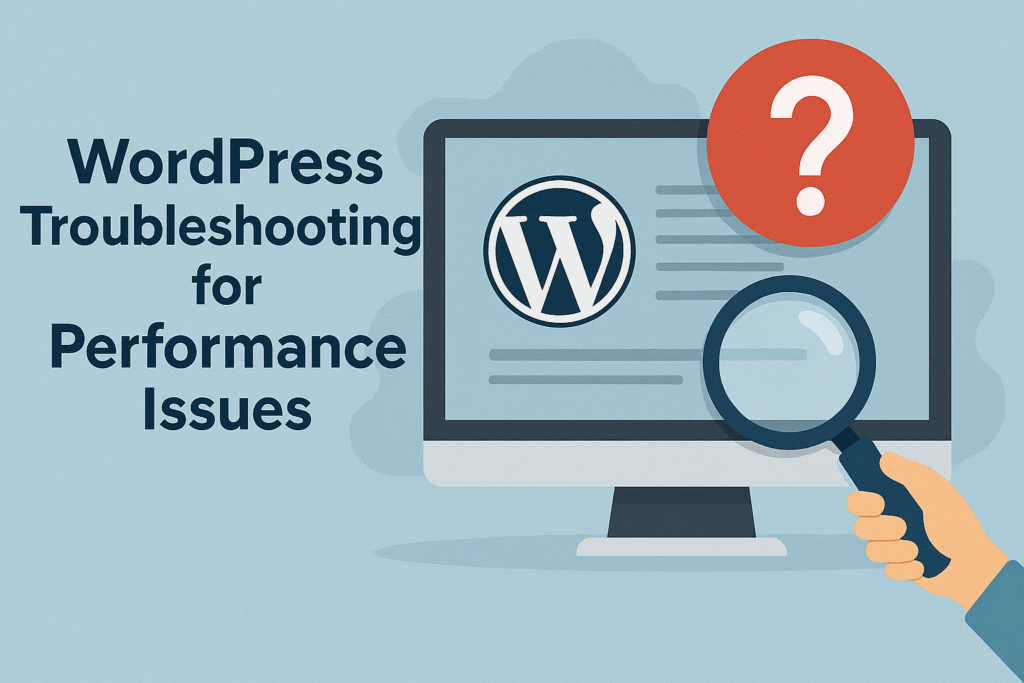Common Performance Issues That Affect WordPress Sites
There’s nothing more frustrating for website visitors and owners alike than slow loading times, lag, or performance hiccups. A WordPress site’s performance can significantly affect user experience, search engine rankings, and overall site success.
WordPress, being an open-source platform, offers a high degree of flexibility, but it also means that it’s prone to performance issues caused by multiple factors such as unoptimized code, excessive plugins, and large media files. Whether you’re running a personal blog or a business website, site performance issues need to be tackled promptly to ensure smooth and seamless browsing experiences. We’ll explore common WordPress performance problems, identify their causes, and provide actionable solutions that you can implement right away to optimize your WordPress website for speed and efficiency.

Causes of Performance Issues
Performance issues in WordPress websites are often caused by a combination of factors. Understanding these factors can help you pinpoint the source of the problem and apply the right fixes. Let’s take a closer look at the most common causes of performance issues:
Related Posts
- WordPress Customization Expert
- Custom WordPress Web Design & Customization
- How to Edit WordPress Header
Large Images and Unoptimized Media Files
One of the most frequent reasons for a slow WordPress site is large, unoptimized images and media files. High-resolution images can quickly inflate the size of your pages, resulting in longer loading times. Many users upload images straight from their cameras or phones without reducing their file sizes first, leading to unnecessary bloat.
While images are crucial for enhancing the user experience, unoptimized media can cause significant slowdowns, especially on mobile devices with slower internet connections.
Unoptimized Code and Too Many HTTP Requests
WordPress websites often rely on a range of plugins, themes, and third-party scripts. While these tools can add functionality to your site, they also increase the amount of code that needs to be processed every time someone loads your pages. This extra code can slow down your website’s performance, especially when not optimized.
Additionally, each time a user loads a page, the browser makes HTTP requests to retrieve different assets like CSS, JavaScript, and images. A high number of requests can create a bottleneck that negatively impacts page load times.
Excessive or Outdated Plugins
Another performance killer is having too many plugins installed on your WordPress site. While plugins provide a convenient way to extend functionality, they can also eat up resources and contribute to slowdowns, especially if they are poorly coded or outdated.
Some plugins may load unnecessary scripts on every page, while others could conflict with each other, resulting in slower response times or even crashing the site.
Inefficient Hosting Environment
Your hosting environment is another crucial factor when it comes to performance. Shared hosting plans, which many WordPress users opt for to save costs, can result in slow speeds due to limited server resources. If your website shares server space with many other sites, your performance may be affected when others consume more resources.
Even if you’re not on shared hosting, hosting issues like server misconfigurations or inadequate hardware (such as insufficient RAM or processing power) can also contribute to performance problems.
How to Resolve Performance Problems
Now that we know the common causes of WordPress performance issues, let’s explore actionable solutions that can fix these problems and improve your site’s speed and overall functionality.
Image Optimization and Caching
Image Optimization
Optimizing your images can significantly improve site speed. There are two ways to optimize images for WordPress: manually resizing them before uploading or using an image optimization plugin.
- Resize images to the optimal dimensions needed for your website.
- Compress images to reduce their file size without compromising quality. You can use tools like TinyPNG or ImageOptim for this.
Alternatively, you can install an image optimization plugin like Smush or ShortPixel. These plugins automatically optimize images as you upload them to your site and can even bulk-optimize previously uploaded images.
Related Posts
Caching Your Website
Caching is another essential technique to improve WordPress performance. By caching static files, such as images, CSS, and JavaScript, the server doesn’t need to generate them every time a visitor accesses your website. This reduces the load on your server and speeds up the page load time for repeat visitors.
WordPress caching plugins like W3 Total Cache, WP Super Cache, or WP Rocket can handle this for you. Once installed and configured, these plugins will create static copies of your pages and serve them to visitors, improving speed significantly.
Using a Content Delivery Network (CDN) and Compressing Files
Content Delivery Network (CDN)
A CDN is a network of servers distributed across different geographic locations. When a user visits your website, the CDN will deliver your content from the server closest to them. This reduces the distance that data needs to travel, resulting in faster load times.
Some popular CDN services you can use with WordPress include Cloudflare, MaxCDN, and KeyCDN. These services cache your content and distribute it to users globally, helping to reduce load times.
File Compression
Compressing files such as CSS, JavaScript, and HTML can help reduce their size and improve your website’s load time. Plugins like Autoptimize or W3 Total Cache can help with this process. They minify and compress your website’s files, making them easier and faster for browsers to load.
Removing Unnecessary Plugins and Themes
While plugins are useful, having too many can cause performance issues. It’s essential to regularly audit your plugins and remove any that are unnecessary or outdated.
To speed up your site:
- Deactivate and delete unused plugins to reduce bloat.
- Keep active plugins up to date to ensure they’re optimized for performance.
- Consider using multipurpose plugins to reduce the number of plugins you need. For example, a caching plugin like WP Rocket may handle both caching and minification.
Additionally, deactivate and delete any unused themes. WordPress stores inactive themes in the database, which can take up space and contribute to sluggishness.

Ensuring Your Site is Fast and Reliable for Users
Optimizing your WordPress site’s performance is not just about achieving faster load times—it’s about ensuring that your visitors have a positive, seamless experience when they interact with your website. By addressing common performance issues such as large images, unnecessary plugins, unoptimized code, and inefficient hosting, you can significantly improve site speed and reliability.
Regularly monitoring your site’s performance and implementing these best practices will keep your WordPress site in tip-top shape, enabling both users and search engines to navigate it with ease. Remember, a fast and responsive site is a happy site—both for you and your users!
Frequently Asked Questions
Why is my WordPress site slow?
Your WordPress site may be slow due to issues like unoptimized images, too many plugins, slow hosting, or inefficient code. These problems can increase load times and cause lags.
How can I speed up my WordPress website?
Speed up your site by optimizing images, using caching plugins, reducing the number of plugins, and employing a content delivery network (CDN). These techniques can help reduce load times.
What is a CDN, and how does it help my WordPress site?
A CDN is a network of servers that distributes your site’s content across the globe. It helps deliver content from the server closest to your visitors, improving load times and reducing lag.
How do I check my WordPress site’s performance?
You can check your website’s performance using tools like GTMetrix, Pingdom, or Google PageSpeed Insights. These tools analyze your site’s speed and offer suggestions for improvement.
Key Takeaways
- WordPress performance issues are commonly caused by unoptimized images, excess plugins, and inefficient server configurations.
- To resolve issues, focus on image optimization, caching, and reducing the number of HTTP requests made by your site.
- CDNs and file compression are excellent solutions for speeding up your website.
- Regular maintenance, including plugin audits and hosting reviews, is essential to keep your site running smoothly.
